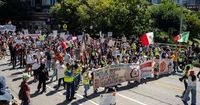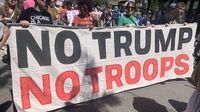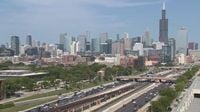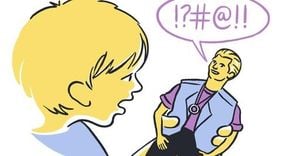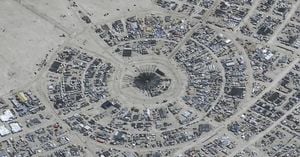Chicago is once again at the center of a heated national debate, as President Donald Trump renews his threats to send the National Guard into the city in response to crime and immigration concerns. Over Labor Day weekend, the city’s streets and airwaves were alive with protests, political sparring, and a growing sense of uncertainty about what the coming days might bring.
Trump’s rhetoric has been unrelenting. At a recent cabinet meeting, he described Chicago as a “hellhole” and a “killing field,” painting a dire picture that many local leaders and residents say doesn’t match the city’s current reality. Nonetheless, the president’s threats to deploy troops have reignited fierce debate among Chicagoans and drawn sharp lines between city, state, and federal officials.
According to WBEZ, the economic narrative for Chicago is not as bleak as Trump suggests. Choose Chicago CEO Kristen Reynolds reported a 6.5% increase in tourist visitors compared to the usual 2.5% to 3% annual growth, though the numbers still lag behind pre-pandemic 2019 levels. Yet, crime remains a concern. Between June 24 and August 23, 2025, the City of Chicago Data Portal recorded 72 burglaries of commercial and business properties, most involving forcible entry.
On the ground, opinions are deeply divided. The Southwest News-Herald found residents like Robert Fabian, a former teacher living near Midway Airport, in support of a National Guard deployment. “It’s sad that we need to have them in the city but I think we’ve come to a point where we should have them,” Fabian said. “Too many of us are afraid to walk the streets, to go places we normally used to go to.”
Others, like Southwest Side resident Silvia Rapacz, are firmly opposed. “I’m against it,” Rapacz told the Southwest News-Herald. “I think the National Guard should be used for emergencies, when we need people to help our citizens or the police in some instances but not for arresting people or taking people away. When we were having all the riots, they should have been here then.”
Raul Garcia, another area resident, echoed concerns about overreach. “I feel like I have never felt a threat in Chicago,” he said. “I think a military presence is [going] a little overboard. We’re not a military state. We’re not in a war.” Garcia argued that the National Guard would be better deployed for natural disasters, like the recent flooding in Southwest Side communities.
The legal and political landscape is just as complicated. Illinois, as a sovereign state, has full autonomy over its affairs—unlike Washington, D.C., which falls under federal jurisdiction. This distinction has made Trump’s threat to send in troops a legally murky proposition, according to the research database EBSCO.
On August 31, Department of Homeland Security Secretary Kristi Noem told ABC News that “nothing is off the table” regarding National Guard deployments to U.S. cities, including Chicago. She confirmed that the federal government would be adding resources to existing ICE operations throughout Illinois, further fueling speculation about imminent federal action.
Labor Day weekend brought the debate into sharper focus. Both Secretary Noem and Illinois Governor JB Pritzker appeared on CBS News’ “Face the Nation” to lay out their positions. Pritzker remained adamant in his opposition to federal troops in Chicago, calling the idea “dangerous” and “un-American.” “We would like ATF agents to help us take more guns off the streets. We would like (the) FBI, again, to coordinate with our local law enforcement to help catch perpetrators of crimes. If they would do that, we would welcome that,” Pritzker said.
Noem, for her part, criticized Pritzker’s resistance. “This seems like it’s more about Governor Pritzker’s ego now, rather than actually protecting his people,” she said. “If he has one murder in the City of Chicago, he should be calling President Trump and saying, ‘What’s your ideas?’”
Chicago Mayor Brandon Johnson has taken a proactive stance, signing an executive order on September 1 to establish the “Protecting Chicago” initiative. The order aims to resist federal troop deployment and safeguard residents’ rights amid stepped-up ICE enforcement. It also requires Chicago Police Department officers to wear clearly identifiable outer gear during crowd control and safety operations, helping residents distinguish between local police and federal agents.
“We will protect our Constitution, we will protect our city, and we will protect our people,” Johnson declared at a press conference. “We do not want to see tanks in our streets. We do not want to see families ripped apart. We do not want grandmothers thrown into the back of unmarked vans. We don’t want to see homeless Chicagoans harassed or disappeared by federal agents. We don’t want to see Chicagoans arrested for sitting on their porch.”
Johnson’s executive order also prohibits law enforcement from wearing face coverings to conceal their identities, a practice routinely employed by ICE agents. The mayor’s office is bracing for the possibility of militarized immigration enforcement, National Guard troops, and even active duty military with armed vehicles appearing on city streets by the end of the week. “We may see militarized immigration enforcement. We may also see National Guard troops. We may even see active duty military and armed vehicles in our streets,” Johnson warned.
The city’s sanctuary policies, which prohibit local police from assisting ICE without a criminal warrant, remain a flashpoint in the conflict. Both Pritzker and Johnson have doubled down on these protections, even as they acknowledge their inability to stop federal immigration operations outright.
Protesters made their voices heard on September 1, rallying in the West Loop and Fulton Market. “We’re gonna defend our democracy in the city of Chicago,” Johnson told the crowd, leading chants of “No troops in Chicago.” The demonstrations reflected widespread anxiety about the potential for military checkpoints, armored vehicles, and increased ICE raids. According to Axios, ICE raids are expected to intensify nationwide starting this week, with some operations possibly staged from the Great Lakes Naval Station near North Chicago.
Despite a 21% decline in overall crime, a 32% drop in homicides, a 31% decrease in robberies, and a 49% reduction in vehicular hijackings since the start of 2025, the city was not spared violence over the Labor Day weekend. At least 53 shootings and seven deaths were reported, including two mass shootings in Bronzeville, according to city data.
Governor Pritzker condemned the federal troop plans as “an attack on the American people by the president of the United States,” highlighting that red states with higher crime rates have not seen similar interventions. “Are any of the red states that vote for him, voted for him, seeing troops in their states, and yet they have higher crime rates than the city of Chicago? No,” he said.
As the city braces for what could be a pivotal week, the debate over federal intervention continues to pit concerns about safety, civil liberties, and political autonomy against one another. For many Chicagoans, the outcome will shape not just the city’s immediate future, but also the larger national conversation about the limits of federal power and the meaning of public safety in America.
